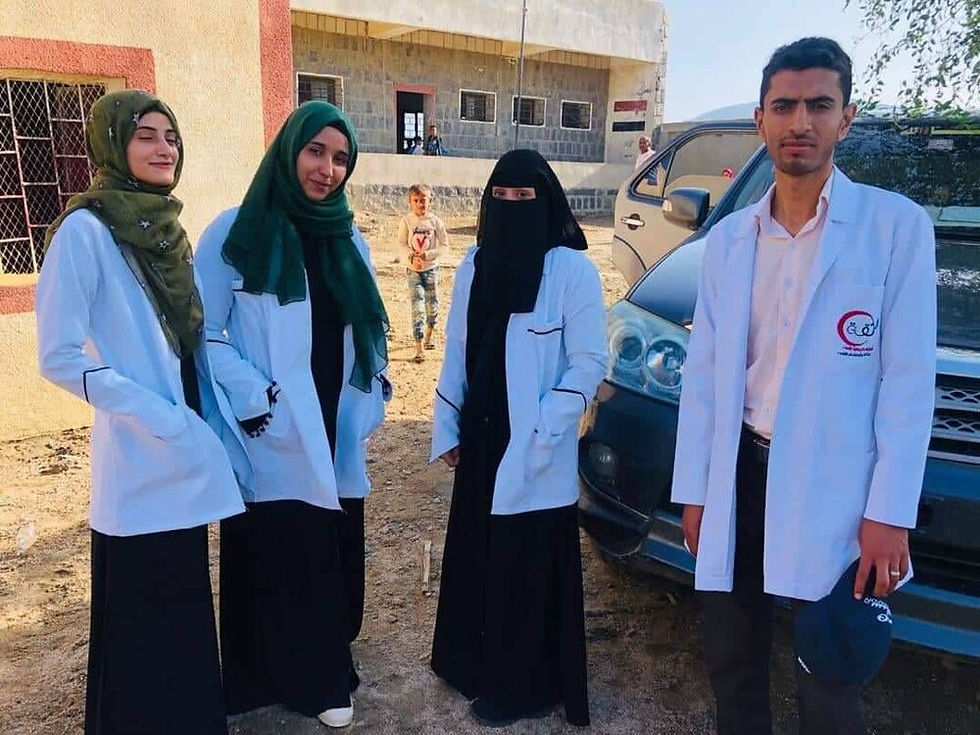Millennium Fellows in Yemen Combat Malaria
- Millennium Fellowship
- Oct 31, 2019
- 3 min read

As of September 2019, there have been over 600,000 suspected cases of cholera in Yemen and over 900 cholera related deaths. The outbreak of this deadly disease along with the ongoing civil war has overshadowed other threats in Yemen including, malaria.
However, three Millennium Fellows at Al- Razi University have refocused their public health efforts to focus on the under-spotlighted disease of malaria. One of these Fellows, Sally Al-Shrjabi, started her education at the Al Razi College of Medicine. In the course of her studies, she transitioned from medicine to public and community health in order to focus on preventive health techniques as opposed to active treatment.
“I think it is much better to focus on learning how to prevent diseases from occurring in the first place. I think my public health major allows me to interact more with society and help them to stay safe and healthy.” ~ Sally Al-Shrjabi

Although Sally, Hanin, and Mizer are now seniors at Al Razi University, they never had a chance to screen members of their community for any preventable diseases, including malaria, before joining the Millennium Fellowship. The Millennium Fellowship gave Al Razi Fellows the credibility to form partnerships with their local health centres and to obtain the necessary materials to treat malaria. With the recognition from the Fellowship, Sally, Hanin, and Mizer were able to travel to 7 different villages in the Bani Qais District, Hajjah Governorate.
“مشروع الملاريا كان قد تم دراسته قبل سنه لكن للأسف لم نلقى الدعم المادي لتمويل المشروع ، وعلى الرغم من دعم الجامعة لجهودنا واجهنا العديد من الصعوبات بما في ذلك التحديات الاجتماعية والاقتصادية.، لكن الزمالة الألفية ساعدتنا وصلتنا لناس ساعدتنا كثير في تقديم خدمة لمجتمعنا ”
“We started planning the malaria project one year ago but unfortunately, we did not find sponsorship, and despite the university's support we faced many difficulties including socio-economic challenges. However, the Millennium Fellowship has helped us reach people that helped us a lot in serving our community ~ Hanin Al-Sabri

Although the Millennium Fellowship first opened the door for the Al Razi Fellows to help their community, they still faced significant challenges in implementing the project. One such challenge was the lack of transportation due to the war. The Millennium Fellows and Al-Razi University overcame this obstacle by getting security clearance from the National Organization for the Coordination of Humanitarian Affairs. This is the authority responsible for granting permits to execute community projects. Once their clearance was approved, the government and security authorities were also informed of their malaria prevention project. They also had to cross multiple obstacles in the checkpoints on the roads in order to reach these villages. Once the clearance was approved they coordinated the project with the Malaria Control Program who were able to provide training and doses of the malaria medication. They also provided the vehicle to transport students to the villages.
Despite facing significant obstacles, the three Millennium Fellows and a small team of volunteers were able to screen over 500 people and treat 10 identified cases of malaria. The villages that they went into were often very far removed from the city centre and were not priority areas for medical professionals. Due to this, the Millennium Fellows were immediately identified as medical experts and were able to help people who have little to no access to medical services.
“كان عملهم متميز جدا ويعتبر اكثر مشروع تأثيرا من حيث المهام والانشطة فقد سافر الطلاب الى مكان بعيد جدا عن مقر الجامعة واستمروا فترة في موقع المشروع في منطقة ريفية"
“The work was outstanding and is one of the most impactful projects when it comes to the activities and tasks that were carried out. The students travelled to a location that’s very far from the university campus and they remained there in the project site in a rural area.” ~ Dr. Sharaf Shana, Fellowship Coordinator at Al-Razi University




Comments